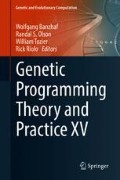Abstract
In natural ecologies, niches are created, altered, or destroyed, driving populations to continually change and produce novel features. Here, we explore an approach to guiding evolution via the power of niches: ecologically-mediated hints. The original exploration of ecologically-mediated hints occurred in Eco-EA, an algorithm in which an experimenter provides a primary fitness function for a tough problem that they are trying to solve, as well as “hints” that are associated with limited resources. We hypothesize that other evolutionary algorithms that create niches, such as lexicase selection, can be provided hints in a similar way. Here, we use a toy problem to investigate the expected benefits of using this approach to solve more challenging problems. Of course, since humans are notoriously bad at choosing fitness functions, user-provided advice may be misleading. Thus, we also explore the impact of misleading hints. As expected, we find that informative hints facilitate solving the problem. However, the mechanism of niche-creation (Eco-EA vs. lexicase selection) dramatically impacts the algorithm’s robustness to misleading hints.
Access this chapter
Tax calculation will be finalised at checkout
Purchases are for personal use only
References
Bongard, J. C. and Hornby, G. S. (2010). Guarding Against Premature Convergence While Accelerating Evolutionary Search. In Proceedings of the 12th Annual Conference on Genetic and Evolutionary Computation, GECCO ‘10, pages 111–118, New York, NY, USA. ACM.
Chesson, P. (2000). Mechanisms of Maintenance of Species Diversity. Annual Review of Ecology and Systematics 31:343–366.
Cooper, T. F. and Ofria, C. (2002). Evolution of stable ecosystems in populations of digital organisms. In Artificial Life VIII: Proceedings of the Eighth International Conference on Artificial life, pages 227–232.
De Jong, K. A. (1975). Analysis of the behavior of a class of genetic adaptive systems.
Goings, S. (2010). Natural niching: Applying ecological principles to evolutionary computation. Dissertation, Michigan State University.
Goings, S., Goldsby, H. J., Cheng, B. H., and Ofria, C. (2012). An ecology-based evolutionary algorithm to evolve solutions to complex problems. Artificial Life, 13:171–177.
Goings, S. and Ofria, C. (2009). Ecological approaches to diversity maintenance in evolutionary algorithms. In IEEE Symposium on Artificial Life, 2009. ALife ‘09, pages 124–130.
Goldberg, D. E. and Richardson, J. (1987). Genetic algorithms with sharing for multimodal function optimization. In Genetic algorithms and their applications: Proceedings of the Second International Conference on Genetic Algorithms, pages 41–49. Hillsdale, NJ: Lawrence Erlbaum.
Helmuth, T. and Spector, L. (2015). General Program Synthesis Benchmark Suite. Proceedings of the 2015 Annual Conference on Genetic and Evolutionary Computation, GECCO ‘15, pages 1039–1046, New York, NY, USA, ACM.
Helmuth, T., Spector, L., and Matheson, J. (2015). Solving Uncompromising Problems With Lexicase Selection. IEEE Transactions on Evolutionary Computation, 19(5):630–643.
Hendry, A. P. (2016). Eco-evolutionary Dynamics. Princeton University Press.
Holland, J. H. (1985). Properties of the bucket brigade. In Proceedings of an International Conference on Genetic Algorithms, pages 1–7, Hillsdale, NJ, USA. Lawrence Erlbaum Assoc.
Hornby, G. S. (2006). ALPS: The Age-layered Population Structure for Reducing the Problem of Premature Convergence. In Proceedings of the 8th Annual Conference on Genetic and Evolutionary Computation, GECCO ‘06, pages 815–822, New York, NY, USA. ACM.
Hu, J., Goodman, E., Seo, K., Fan, Z., and Rosenberg, R. (2005). The Hierarchical Fair Competition (HFC) Framework for Sustainable Evolutionary Algorithms. Evolutionary Computation, 13(2):241–277.
Kosmidis, I. (2017). brglm: Bias Reduction in Binary-Response Generalized Linear Models, version 0.6.1 http://www.ucl.ac.uk/~ucakiko/software.html
Lenski, R. E., Ofria, C., Pennock, R. T., and Adami, C. (2003). The evolutionary origin of complex features. Nature, 423(6936):139–144.
Mahfoud, S. W. (1992). Crowding and preselection revisited. Urbana, 51:61801.
Mouret, J.-B. and Doncieux, S. (2009). Using Behavioral Exploration Objectives to Solve Deceptive Problems in Neuro-evolution. In Proceedings of the 11th Annual Conference on Genetic and Evolutionary Computation, GECCO ‘09, pages 627–634, New York, NY, USA. ACM.
Mouret, J.-B. and Clune, J. (2015). Illuminating search spaces by mapping elites. In arxiv:1504.04909
R Core Team. (2017). R: A Language and Environment for Statistical Computing. https://www.R-project.org
Schoener, T. W. (2011). The Newest Synthesis: Understanding the Interplay of Evolutionary and Ecological Dynamics. Science, 331(6016):426–429.
Spector, L. (2012). Assessment of problem modality by differential performance of lexicase selection in genetic programming: a preliminary report. In Proceedings of the 14th annual conference companion on Genetic and evolutionary computation, pages 401–408. ACM.
Stanley, K. and Miikkulainen, R. (2004). Competitive coevolution through evolutionary complexification. J. Artif. Intell. Res. (JAIR), 21:63–100.
Taylor, T., Bedau, M., Channon, A., Ackley, D., Banzhaf, W., Beslon, G., Dolson, E., Froese, T., Hickinbotham, S., Ikegami, T., McMullin, B., Packard, N., Rasmussen, S., Virgo, N., Agmon, E., Clark, E., McGregor, S., Ofria, C., Ropella, G., Spector, L., Stanley, K. O., Stanton, A., Timperley, C., Vostinar, A., and Wiser, M. (2016). Open-Ended Evolution: Perspectives from the OEE Workshop in York. Artificial Life, 22(3):408–423.
Wickham, H. (2009). ggplot2: Elegant Graphics for Data Analysis. Springer-Verlag, New York.
Author information
Authors and Affiliations
Corresponding author
Editor information
Editors and Affiliations
Rights and permissions
Copyright information
© 2018 Springer International Publishing AG, part of Springer Nature
About this paper
Cite this paper
Dolson, E., Banzhaf, W., Ofria, C. (2018). Applying Ecological Principles to Genetic Programming. In: Banzhaf, W., Olson, R., Tozier, W., Riolo, R. (eds) Genetic Programming Theory and Practice XV. Genetic and Evolutionary Computation. Springer, Cham. https://doi.org/10.1007/978-3-319-90512-9_5
Download citation
DOI: https://doi.org/10.1007/978-3-319-90512-9_5
Published:
Publisher Name: Springer, Cham
Print ISBN: 978-3-319-90511-2
Online ISBN: 978-3-319-90512-9
eBook Packages: Computer ScienceComputer Science (R0)

